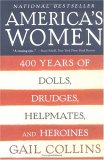Summary | Excerpt | Reading Guide | Reviews | Readalikes | Genres & Themes | Author Bio

Critics' Opinion:
Readers' Opinion:
First Published:
Sep 2003, 556 pages
Paperback:
Sep 2004, 592 pages
The young Indian girl may have done all this simply because she liked Smith and the other Englishmen, or it may have all been part of Powhatan's attempts to control the relationship between his tribe and the newcomers. Some historians think the beheading drama was staged to put Smith in Powhatan's debt. Certainly Pocahontas understood the frictions between the whites and her own people--at one point, the English seized her and held her as hostage. Her marriage to the English leader John Rolfe cemented peace between the colonists and Powhatan's confederacy for the rest of her life. Both husband and wife may have seen their union as diplomatic, rather than romantic. Rolfe wrote a letter to his superiors justifying the marriage "for the good of this plantation." The bride-to-be did not confide her own feelings to anyone who had the power to write them down, but she was said to have already been married to a man from her own tribe. Later, she went with Rolfe and their young son to England in what we would today call a public relations tour, aimed at encouraging more investment in Virginia. She had her portrait painted wearing English clothes, satisfied all the nobility's curiosity to see a "noble savage," and was presented at court and reunited with her old friend John Smith. Before she could return home she died, probably of pneumonia. She was only about twenty years old.
"IT IS NOT KNOWEN WHETHER
MAN OR WOMAN BE THE MOST NECESSARY"
Almost every unmarried Englishwoman who emigrated to the Chesapeake must have dreamed of duplicating Temperance Flowerdew's or Joan Pierce 's luck. There wasn't much prospect of finding a good, upwardly mobile mate back home, where England was changing from a rather backward agricultural country to a mercantile giant and dislocating hundreds of thousands of rural workers in the process. Very few available men could support a family. In fact, there seemed to be very few men around, period--the country was still recovering from a plague that had mysteriously killed far more men than women. Of the many sales pitches offered by the colonies, none struck home with women more than the prospects of finding a suitable spouse. "If any Maid or single Woman have a desire to go over, they will think themselves in the Golden Age, when Men paid a Dowry for their Wives; for if they be but civil, and under 50 years of Age, some honest Man or other will purchase them for their Wives," promised one promoter. (An even more enthusiastic propagandist announced that the women of North Carolina were terrifically fertile "and many Women from other Places who have been long Married and without Children, have remov'd to Carolina, and become joyfull Mothers.")
The recruiters preferred not to mention certain details. Even after the food shortages ended, the Chesapeake was a death trap. The brackish water, mosquito-laden swamps, and steamy weather killed most people during their first year. Those who survived often suffered from weakness or periodic fits as an aftermath of their exposure to malaria. At least 6,000 people came to Virginia between 1607 and 1624; by 1625, only 1,200 survivors were still there. But the colonies' sponsors were desperate to get females, by hook or by crook--their ventures were in danger of being wrecked on the shoals of dissolute, irresponsible young manhood. In 1619, the Virginia House of Burgesses, petitioning that wives as well as husbands be eligible for grants of free land, argued that in a new plantation, "it is not knowen whether man or woman be the most necessary." London recruiters began searching for marriageable women, offering free passage and trousseaus for girls of good reputation and a sense of adventure. When they married, their new husbands had to reimburse the company with 120 pounds of good leaf tobacco. The first shipment of ninety "tobacco brides" arrived in Jamestown in the spring of 1620. The youngest, Jane Dier, was fifteen or sixteen when she left England. Allice Burges, at twenty-eight, was one of the oldest and said to be skillful in the art of brewing beer- important in a place where the water was generally undrinkable. Cicely Bray was from one of the best families, of a rank that required her to be addressed as "Mistress" rather than the more plebian "goodwife." But all the brides were respectable women, mostly the offspring of middle-class tradesmen who had died, leaving them with no male protectors. All of them provided references, attesting to their honesty, sobriety, and past behavior. Anne Richards was "a woman of an honest [life] and conversation . . . and so is and ever hathe bynne esteemed," wrote one of her parish elders.
From America's Women by Gail Collins. Copyright © 2003 by Gail Collins. All rights reserved. No part of this book may be reproduced in any form without written permission from the publisher, HarperCollins Publishers.





The Flower Sisters
by Michelle Collins Anderson
From the new Fannie Flagg of the Ozarks, a richly-woven story of family, forgiveness, and reinvention.

The House on Biscayne Bay
by Chanel Cleeton
As death stalks a gothic mansion in Miami, the lives of two women intertwine as the past and present collide.

The Funeral Cryer by Wenyan Lu
Debut novelist Wenyan Lu brings us this witty yet profound story about one woman's midlife reawakening in contemporary rural China.
Your guide toexceptional books
BookBrowse seeks out and recommends the best in contemporary fiction and nonfiction—books that not only engage and entertain but also deepen our understanding of ourselves and the world around us.